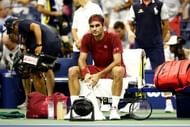Mental strength, or the lack of it, is one of the easiest things to attribute for a player's loss.
"Got a good game, but a complete headcase."
"Plays well until the finish line is in sight."
"Lacks composure in the crunch moments."
"Doesn't know how to handle pressure."
How many times have we heard lines like these to describe a player's failures, whether in a single match or over their entire career? When you see a player missing what look like routine forehands, or make completely unfathomable double faults, you search for an explanation; any explanation. And blaming what you can't see - the stuff between the ears - is often the most convenient option.
I've been guilty of that on numerous occasions myself. There have been a lot of times when I have spoken derisively of a spectacular choke job or a seemingly half-hearted effort by a top player, because surely you can't miss a sitter overhead at the Grand Slam level, right?
After a point though, you realize that every athlete playing professional tennis - or any professional sport, really - has oodles of mental strength to have got where they are. It's just that sometimes, there is a specific set of circumstances for which they are not prepared, and which manifests in the form of a mortifying horror show on the court.
Aryna Sabalenka took on Naomi Osaka in the new Louis Armstrong stadium yesterday, and at the start it looked like she was yet another mentally fragile dynamo coming from the seemingly endless eastern European production line. She was overpowering Osaka from the baseline, but missing just enough finishing shots to lose the first set in a hurry.
"Why can't she dial it down and just try to get the ball in?" a perplexed member of the crowd sitting behind me wondered at the changeover.

As the second set showed, it wasn't that she couldn't dial it down. It was that she had made a living out of going for the kill on practically every shot, and she wasn't about to stop doing that in the (so far) biggest match of her career.
She blasted her way to a comfortable lead, but as she got close to wrapping up the set, she started making a few nervous errors. On one point, she found herself in the middle of the court, and her forehand - which was neither a proper approach shot nor big enough to be a winner - was shoveled back over the net by Osaka. The ball was barely out of reach of Sabalenka, and she lunged at the ball in a desperate bid to reflex back a volley. But she couldn't get her racquet down in time, and the ball flew past her - and beyond the baseline.
If she had touched the ball, she would've probably lost the point; the fact that she missed worked in her favor. It was an error in judgment, and she immediately gestured to her face in agony; she couldn't afford such lapses if she wanted to win.
Sabalenka went on to lose the match in the third set, but not before showing everyone in Armstrong that she has her own kind of mental fortitude. Hitting the cover off the ball can only take you so far; it is only when you learn to always trust your abilities, like Sabalenka does, that you make the jump to the next level. And when you make a mistake - like Sabalenka did on that failed volley attempt - you can still take a step back, admonish yourself, and start all over again - that's what wins you sets at the Grand Slam level.
Carla Suarez Navarro won more than just sets when the spotlight shone on her later in the day at Ashe. She also won the right to be called tennis' Brock Lesnar, stopping Maria Sharapova's famed Arthur Ashe night match winning streak of 22 matches.
But more importantly, she showed that sometimes, even the fiercest of fighters can be undone by a mix of calmness, persistence and variation. Sharapova dug in her heels like she always does, hitting one baseline missile after another, but Suarez Navarro was the picture of composure as she nonchalantly got almost every one of them back.
For this match I was sitting in a seat that was a little more sideways than usual, and that angle gave me a good look at the height of the two players' shots. All of Sharapova's groundstrokes had nearly the same amount of net clearance - which is to say, very little. They barely skimmed over the net, zooming flat and hard towards the corners.
But the Spaniard didn't miss a beat; darting around the baseline with some nimble footwork, she looped, sliced, pushed and occasionally hit over the ball, with each shot going over the net at a different height. She forced Sharapova to hit a different shot every time, and that's never been the Russian's strong suit.

The winning streak ended at 22, but the match that did it told us both why she had won so many in the first place, and why she couldn't get the job done this time. There are very few players who can hit with as much power as consistently as Sharapova, but also very few in the women's game today who can change the course of rally as intelligently as Suarez Navarro. Mental strength comes in many forms - it is about refusing to lose just as much as it is about executing a series of chess-like moves that flummox your seemingly superior opponent.
We thought Roger Federer the most superior opponent that John Millman would ever have to play against. But that's the thing about match-ups in tennis; you don't know when, or why, you come up against a particular set of elements that work for or against you.
Federer looked well in control during the first set, but by the start of the second you could sense that something was wrong. For one thing, the New York humidity had gotten to its infamously ridiculous levels, shooting over 75%; for us in the stands it felt like sitting in a sauna. For another, Federer's serve was startlingly non-existent; he maintained a sub-50 first serve percentage for a majority of the match.
When Federer's first serve isn't working, the rest of his game starts deteriorating too. And when you combine that with the energy-draining powers of New York's weather, the opponent - especially a fit and determined one like Millman - suddenly starts feeling very good about his chances.
Federer later said that he struggled to deal with the conditions. He also seemed surprised about it, just like we were - the Swiss has almost never wilted in hot or humid conditions through his career.
"I just thought it was very hot tonight," he said. "Was just one of those nights where I guess I felt I couldn't get air. There was no circulation at all. I don't know, for some reason I just struggled in the conditions tonight. It's one of the first times it's happened to me.
"Yeah, it's uncomfortable. Clearly just keep on sweating more and more and more and more as the match goes on. You lose energy as it goes by," he added.
Millman on his part did everything that a man in his position was required to. He served well, plugged away with his backhand, and repeatedly let Federer know - both with his fist-pumps and his passing winners - that he wasn't going anywhere.
The most shocking thing about the day, though, was the way it ended. While the second set could be considered a choke by Federer - he was serving at 5-4, 40-15 at one point - the third and fourth resembled a scary movie more than a tennis match.

By the end of the match, Federer looked and played like he had no interest in the match any more. He swatted carelessly at returns, tried to worm out of rallies by either approaching the net or hitting a drop shot, and continued serving like a shell of his servebot self.
"Look, at some point also I was just happy that the match was over, I guess," he confessed in the press conference.
Did Federer fail to show the stomach for a fight? The humidity may have been a big factor, but when the man himself says he was happy the match got over, it tells you that his mind was not in the right place yesterday.
Even when you've played tennis at the highest level for 20 years, there can still be days when you are up against a situation that you've not faced before. A bad serving day, an unusually humid court, a scrappy opponent - by the time Federer realized things were slipping away, it was too late. And when he realized it was too late, he just didn't seem capable of toughing it out till the very end.
The crowd, of course, couldn't hide their disappointment. They kept groaning at every one of Federer's inexplicable misses, and repeatedly tried to persuade him into playing better - I heard a fair few cries of "Please, Roger!" and "Don't give up, Rog!" towards the end.
But that may have made it even tougher. With so much riding on your play, and so many eyes focused on every move you make, it can all get too much - even if you are Roger Federer. When you've been doing something for 20 years, your will to fight - for one more match, one more game, one more point - can take a hit.
Federer was happy that the match was over, and I'm guessing most of the spectators left on Ashe were too; the lack of fight was rather unsettling to watch. But knowing what we know about the Swiss, it's not likely we are going to start calling him a mental midget any time soon.
Sometimes, it's just not meant to be your day - irrespective of how mentally strong you are.
Who Are Roger Federer's Kids? Know All About Federer's Twins
